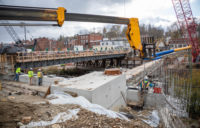South Korea-based Hyundai Engineering & Construction Co. and the government of Chile have apparently resolved a dispute that temporarily halted construction of the $740-million Chacao Channel Bridge in December.
According to reports in Chilean media, the Ministry of Public works will pay at least a portion of $300 million in cost overruns that the firm and its consortium partners Systra and Aas-Jakobsen claimed to have incurred as a result of government-requested design changes following the start of construction in 2018.
In return, the company has agreed to “give up its rights” in certain areas to get the already delayed project back on track, said one report.
In a statement reported by Reuters news service, Ji Sang Ju, vice president of the contractor’s infrastructure and environment division, said the company made the concession to “mitigate the losses” suffered to date, “which demonstrates its commitment to Chile and the Chacao project.”
In a Chilean radio interview, Minister of Public Works Cristóbal Leturia explained that his government had asked for things that were not included in the original bidding rule, and that “those things have a cost,” but it would not be the entire $300 million the consortium originally requested.
The deal, which has yet to be formalized and approved by both sides, is also contingent on having the 2.75-km suspension bridge linking the coastal island of Chiloé with the mainland approximately 630 miles south of Santiago open to traffic by 2025, five years later than originally scheduled.
Tensions between the contractor and the Chilean government boiled over in late December, when the consortium allegedly suspended construction, citing “breach of commitments” and “bad faith” negotiations over scope and cost changes that made it “impossible, in these conditions, to continue with the project.”
The contractor subsequently claimed that reports of a work stoppage were untrue, and that it had begun discussions with the ministry to resolve the dispute.



Post a comment to this article
Report Abusive Comment